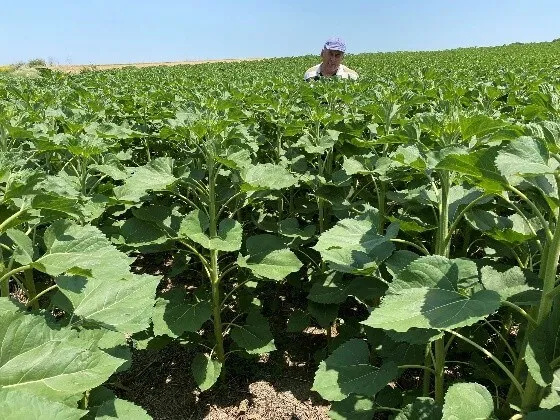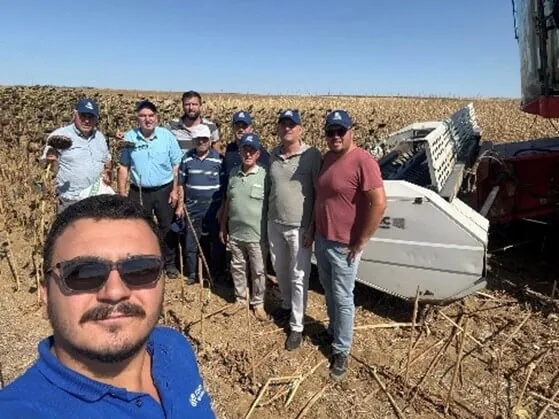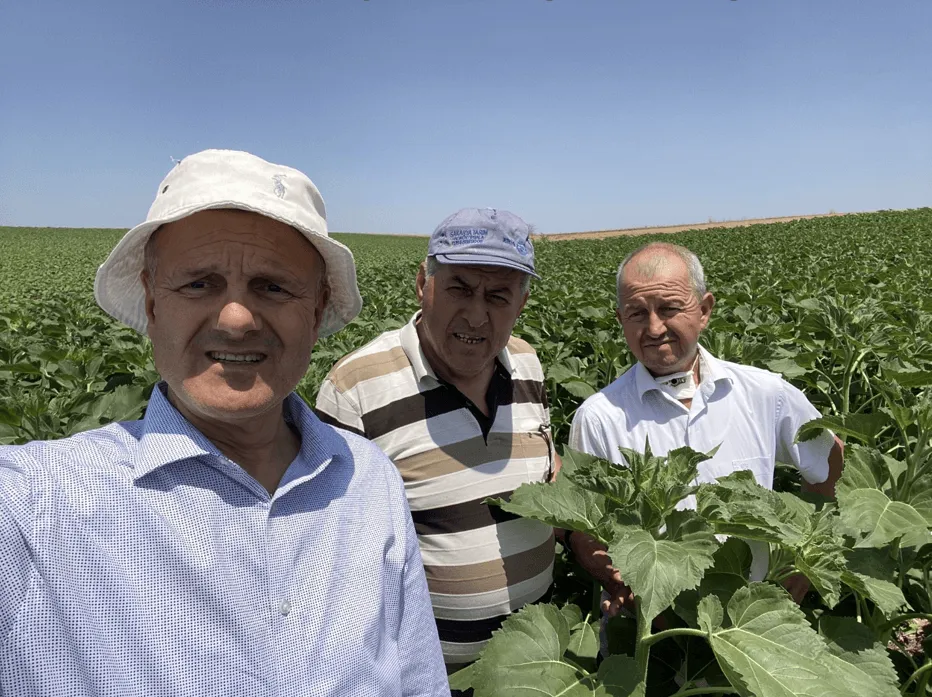Dr. Tuna is a plant geneticist, breeding professor, and researcher at Tekirdağ Namık Kemal University in Tekirdağ, Turkey. In 2015, Dr. Tuna met UVM Extension Research Specialist Lindsey Ruhl while she was in Turkey on a Fulbright fellowship. Together, they researched cover crops in vineyards and have kept in touch ever since, often sharing new research and respective milestones.
Inspired by these discussions, Dr. Tuna pioneered a groundbreaking, multi-year soil health experiment at Tekirdağ Namık Kemal University this year that examines the impact of no-till, cover cropping, and rotation on soil physical, chemical, and biological properties. While developing this program, Dr. Tuna prioritized connecting research with the local agricultural community. This approach made the program especially noteworthy because it isn’t typical for researchers there to engage with farmers.
Recently, Dr. Tuna shared that he convinced a farmer in his home village of Hacıköy to try direct seeding, a no-till practice where a farmer sows a field using a no-till planter or seed drill, leaving much of the soil structure intact. Minimizing tillage can encourage biological activity, reduce erosion and compaction, decrease labor requirements, and improve overall soil health.
The UVM Extension Northwest Crops & Soils team has conducted many research trials assessing the effectiveness of no-till practices, including direct seeding, at Borderview Research Farm and other sites throughout Vermont. Our research has proven that with a bit of patience and an open mind, implementing reduced-tillage practices enhances crop productivity and improves soil health over time. This research helped Dr. Tuna influence farmers in Turkey to try these practices on their farms.
Across the globe, farmers are shifting their agricultural practices to rebuild and increase soil health, including integrating cover crops and reducing tillage.
Adaptation of cover cropping in field crop production has increased since the early 2000s because important field research, like that conducted by UVM Extension, has revealed the multitude of benefits it can provide. These benefits include reducing nutrient and soil loss, increasing soil organic matter, suppressing weeds, serving as extra sources of livestock forage, and even serving as habitat for pollinators and other beneficial insects. To Dr. Tuna’s knowledge, cover cropping hadn’t been practiced in his home village or in neighboring villages until he implemented his soil health program.
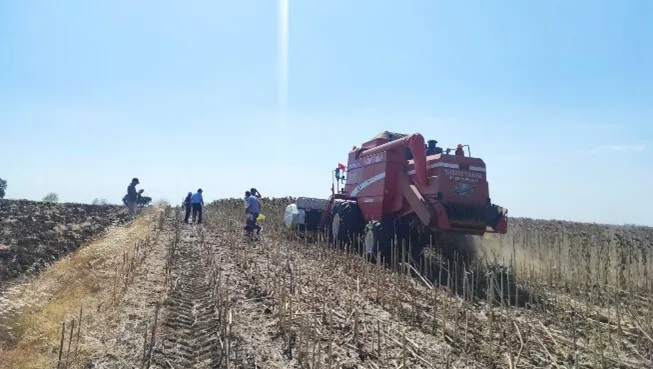
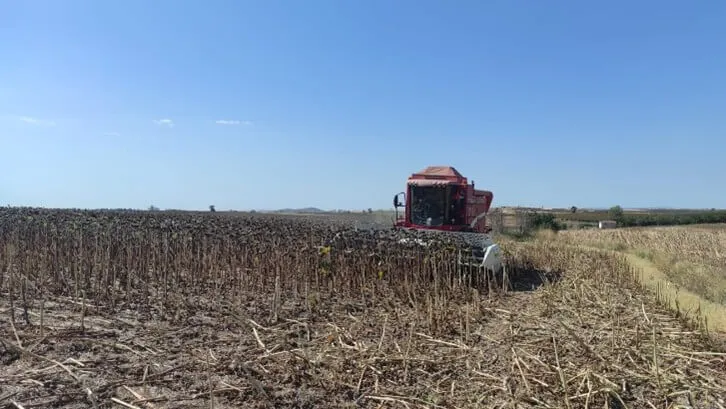
Another agricultural practice that Dr. Tuna helped to encourage is reduced tillage. Many farmers are moving toward reduced tillage practices because the negative effects of constant tillage are becoming increasingly evident globally. Conventionally, farmers use plows, harrows, cultivators, or rippers to prepare fields for planting, control weeds, terminate cover crops, or incorporate manure or other sources of fertility. Tilling fields season after season and year after year destroys soil structure and disrupts important microbial and fungal activity that supports healthy soil and plant growth. Researchers like Dr. Tuna and Lindsey Ruhl are researching reduced tillage practices to solve this problem.
Influenced by Dr. Tuna and promising research results generated by UVM Extension, the farmer direct-seeded sunflowers into his field in Hacıköy, Turkey, on March 19, 2025. The farmer’s friends joked that they would leave the village if this practice actually worked. It was completely new to them. They had confidence in the conventional tillage practices that had brought them success, but Dr. Tuna wanted to help them improve their operations and improve soil health. As the sunflowers began to germinate and flourish, people took notice. Dr. Tuna said that people even came from neighboring villages and counties to see the farming feat!
A cold snap hit the region, bringing freezing temperatures and snowfall. In a neighboring field, the wheat crop was lodged under the snow, but the sunflowers were resilient and stood strong. Sunflowers are known to be cold-weather resistant, and the no-till strategy used to plant them did not diminish their ability to withstand the winter.
The sunflower yield after using reduced tillage was 210 kg/da (~1,875 pounds per acre), which was particularly good considering the dry conditions during the growing season. This yield was somewhat higher than that of sunflower crops cultivated in adjacent fields using conventional cultivation methods. The sunflowers also produced seeds with an impressive oil content of 48%, a result that any farmer would be very happy with, especially one using no-till planting for the first time! Although there is no significant increase in yield, Dr. Tuna does not doubt that more farmers across Turkey will adopt no-till due to lower input costs and, consequently, higher net income.
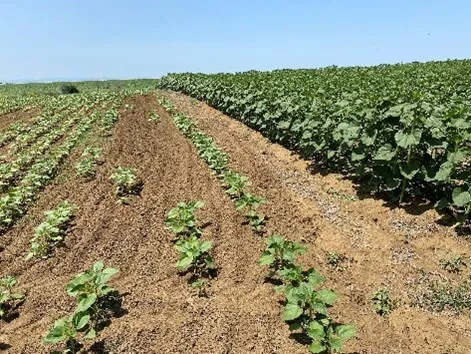
“The whole village is looking forward to seeing the final result!” Dr. Tuna shared. “I believe that next year, the acreage of direct planting in our village will increase.” He remarked that the farmer who directly planted 2.5 acres of sunflowers on his farm this year plans to apply the direct-planting system on his entire farm (75 acres) next year. In addition, two farmers have already bought no-till planters in the village.
The connection between Dr. Tuna and UVM Extension’s Lindsey Ruhl shows how shared research can inspire meaningful change across continents. By sharing data and ideas, the collaboration between Dr. Tuna and UVM’s Ruhl improved the lives and land of farmers.
Cross-cultural research is vital to agricultural innovation. We look forward to more mutually beneficial research collaborations with Dr. Tuna. This kind of partnership lies at the heart of UVM Extension’s mission, and, as this story shows, the impact of that work can reach far beyond Vermont’s borders.
